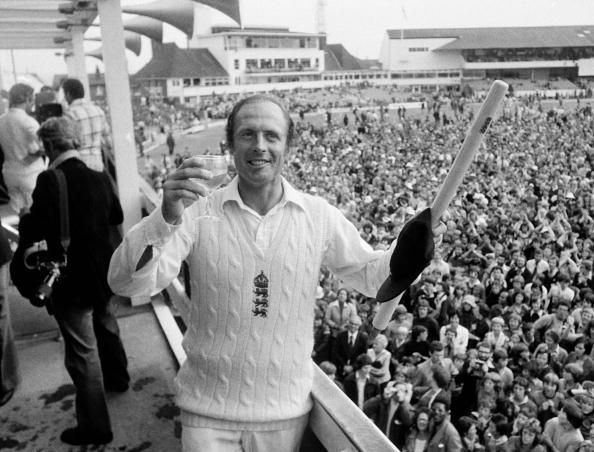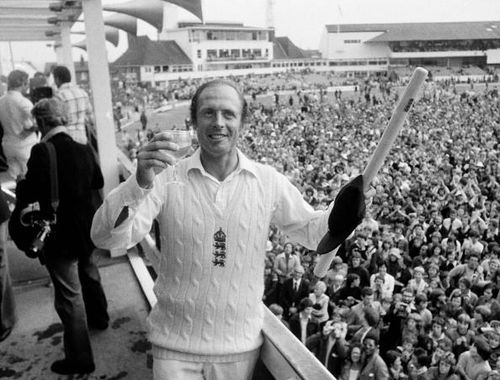
Remembering Geoffrey Boycott's 100th hundred - a momentous day for English cricket

Geoffrey Boycott celebrates his 100th first-class hundred at Headingley
August 11, 1977; Headingley, Leeds: It was close to 6 PM. Greg Chappell came on to bowl to Geoffrey Boycott, who was batting on 96.
The batsman described the moment as, “I kept telling myself: ‘Just look for the gap around extra cover or through the on side’. In case I mistimed the ball in my enthusiasm, I was determined not to hook – even if Chappell dug one in invitingly. I’d faced 231 deliveries before Chappell came running in again. I’d struck 14 fours. The 232nd ball brought my 15th boundary – and my century.”
It was a perfect on-drive, which forced the non-striker Graham Roope to jump out of the way, as the ball raced to the fence. As the enormity of the occasion sunk in to him, Boycott raised both his arms with joy. Boycott had reached his 100th first-class hundred, becoming the 18th player to achieve this feat and the first to reach this landmark while playing a Test match. He still refers to it as “the most magical moment” of his life.
After a self-imposed exile of four years from Test cricket, Boycott was making a return to the international arena in the 1977 Ashes. Just five days before the fourth Ashes Test at Headingley, which happened to be Boycott’s home ground, he had scored his 99th first-class century for Yorkshire against Warwickshire. Expectations were high that he would achieve his 100th in his own backyard against the arch-rivals in the Ashes.
In the book “Fire and Ashes: How Yorkshire’s Finest Took on the Australians”, Boycott recounted the build-up to the game saying, “I kept the Post Office busy. A stack of good luck letters, telegrams and cards began to arrive immediately. On the eve of the Test I was still trying to read, let alone reply, to all of them. During our team meeting that evening, Mike Brearley noticed I wasn’t my usual self. When I asked to be excused from the general conversation, he didn’t hesitate before saying yes, and he didn’t need to ask why I wanted to retreat to my room.”
Nervous and unable to sleep properly, Boycott resorted to taking sleeping pills to try and get some rest. He woke up late the next morning, and had to rush to the stadium, “feeling tired and listless”. He prayed that skipper Brearley would lose the toss, and England would begin by bowling. However, as luck would have had it, Brearley won the toss and elected to bat.
The English innings, opened by Boycott and Brearley, got off to the worst possible start as Brearley got out on the third ball of the match with no runs scored. However, it didn’t deter Boycott, for whom the stage was set to create history.
After a slow and hesitant start, he found his touch and began timing the ball well. “Soon I was middling the ball, and the tiredness began to drain away from me. It was replaced with a solid conviction about two things: this innings had to be treated like any other – and it had to be constructed around the basic principles I’d always employed. Play one delivery at a time; play at the tempo I felt was right for me, and play with a single-minded determination that blocked out extraneous thoughts.”
Dropped by keeper Rodney Marsh when on 22, Boycott reached the score of 36 at lunch, and 79 at tea with some steady batting. The Aussies, led by captain Greg Chappell, tried to unsettle him. Soon after the start of the final session of the day, a delivery from Len Pascoe flicked his wrist band before going to Marsh, which prompted an appeal that Boycott described “so loud that it could be heard in Sheffield”.
An arm-ball from Ray Bright took a deflection as Boycott tried to turn it off his hip, and Marsh quickly caught the ball, claiming a catch. The English went up together in an enthusiastic appeal, which “grew more passionate the clearer it became that umpire Bill Alley was unmoved.”
Boycott later claimed that it had brushed his thigh pad. However the English disagreed, and even some of Boycott’s teammates thought he was out.
Graham Roope, next due to come into bat, said “He got a big nick on one just before I went in. Tony Greig was in with him at the time. Ray Bright was bowling, and the whole ground heard it. Marsh caught it. I was next in. I tell you how much it was out. I got up off my seat and put my gloves on, and he got given not out, and I sat down very quickly.”
Boycott recalled the incident, saying “They thought they had me, but then the Aussies thought they had me many times over the years and they didn’t. I didn’t worry about it. I just knuckled down and got on with it.”
After that incident, as John Woodcock wrote in The Times, “Boycott kept plodding along, taking infinite care not only in the production of his strokes, but in checking his guard, clearing out his block” as he inched closer to his century.